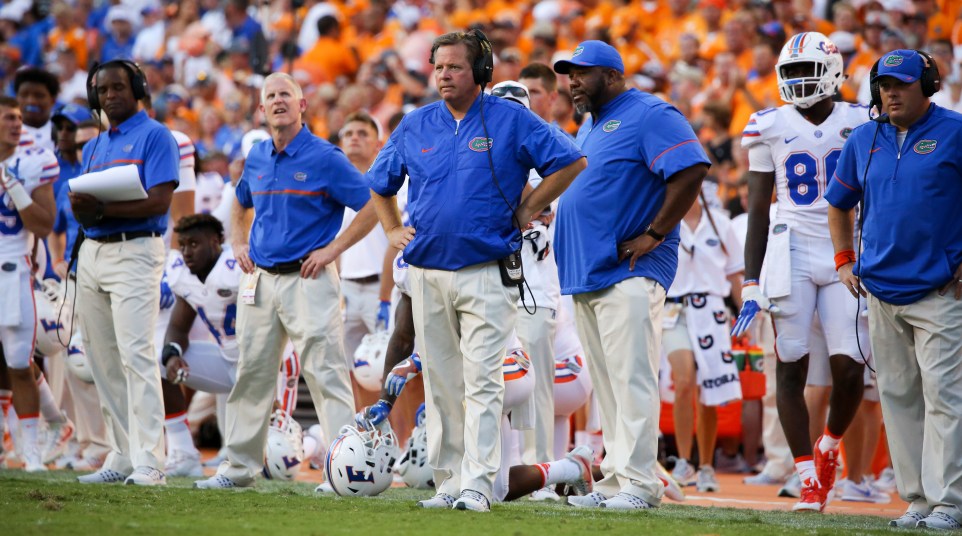
Stakes different, but Florida-Tennessee feels like a big rivalry again
It’s Florida-Tennessee week.
There was a time when that phrase alone commanded national attention, a SportsCenter segment or two, and perhaps even a College Gameday crew. For nine of the first 12 seasons of the two-division SEC, Florida-Tennessee was the conference’s showcase game, despite its innocuous early-season placement on the calendar.
The two schools have met 46 times, a small number in southern college football rivalry lore, but there’s plenty of history packed into this game.
Beginning in 1992, when the SEC split into East and West, either Florida or Tennessee won the SEC East for 10 straight years. Florida or Tennessee captured seven SEC titles in that time-span and, collectively, played for three national championships. Gators fans will argue it would have been four had the 2001 game not been moved from September to December in the aftermath of September 11. The Vols entered the Swamp 18-point underdogs, but behind an epic pregame speech by Phil Fulmer and 226 yards rushing from Travis Stephens, overcame the wall of sound that was the Swamp to upset Florida 34-32 and crush the Gators’ dreams of a national championship date with Miami in the Rose Bowl.
That epic 2001 game was Florida-Tennessee at its zenith. An LSU team coached by a man named Nick Saban upset Tennessee in Atlanta the following week to capture the SEC Championship. Steve Spurrier left for the NFL a month later, and by the time Florida recovered from the “Spurrier’s gone” hangover under fast-talking Ron Zook, Phil Fulmer and Tennessee were on the decline.
Tennessee had won three of four over the Gators when Urban Meyer arrived in 2005, but Meyer emphasized the game, refusing to call Tennessee anything except “our rival” and hammering the Vols, with only one of the six games played during his tenure decided by less than a touchdown. Even after Meyer left, Florida ripped off another four wins, bringing the streak over Tennessee to 10. It was a source of great frustration for Tennessee fans, and respite for Gators fans, that even as Florida struggled to regain national prominence after Meyer’s resignation, the Gators still owned Tennessee.
With only Florida winning and both programs struggling to make noise nationally, the rivalry suffered. As the Vols cycled through multiple coaches after firing Fulmer and Florida transitioned from Meyer to Will Muschamp and Jim McElwain, one of the nation’s best rivalries in the 90s and early aughts became an afterthought. Even the game’s television slot, a 3:30 p.m. CBS start time long considered sacrosanct, was jeopardized. The rivalry was dying.
Then 2015 happened. Butch Jones, who promised to rebuild Tennessee football “brick by brick,” had the Vols poised for a breakthrough win, with a 13-point lead in the fourth quarter at the Swamp. But Florida scored, and then scored again on fourth-and-14, with Will Grier finding Antonio Callway on “Train Right, Jill, Big Ben In,” for a surprising lead. Minutes later, when Aaron Medley’s 53-yard field goal try sailed an eyelash right, Tennessee had lost an 11th game in a row to the Gators. But a dying rivalry had received a needed jolt.
Tennessee’s win last year, a 38-28 come-from-behind victory in a madhouse Neyland Stadium atmosphere, gave Vols fans their first taste of victory in 12 seasons. But it did more than that. It fashioned needed history and enthusiasm back into this rivalry — both in the buildup to the game, when Florida CBs Quincy Wilson and Jalen Tabor guaranteed victory, and in the aftermath, when Vols fans roasted Tabor on social media platforms with video of Juan Jennings racing past a fallen Tabor toward the orange and white checkerboard Knoxville end zone. One year removed from excruciating heartbreak, Vols fans were redeemed.
With one victory, the Vols stoked the embers and revived the dying flame of the Tennessee-Florida rivalry. The swagger and big-game feel is back.
We saw the swagger this week, when Tennessee fans planted a Volunteers flag on the statute of Steve Spurrier, taunting the monument of the man who haunted them so often in the 1990s. We saw the big-game feel this week when Butch Jones told reporters he expected an “explosive game in a tremendous environment.”
We can sense the importance of the game, too.
Both teams enter the football game ranked for only the second time this decade. The stakes are high for the Vols, who can seize early control of the SEC East, a prize that has thus far eluded Butch Jones, despite the various successes in his rebuild.
But the urgency may be even grander on the Florida sideline. A year ago, the game felt like a must win for Butch Jones, who needed to prove he could get over the “Florida hump” in his quest to return Tennessee football to glory. A year later, Connor O’Gara is correct to point out Jim McElwain arguably needs a win more, as a loss would move him to a disappointing 0-2 in his third year, with the offense he was hired to fix showing no real signs of life. With a notoriously impatient fan base, McElwain’s season and job security could begin to unravel with a loss in the Swamp.
A rivalry that was once about who reigned in the conference is now more about restoration and relevance. Two teams, each reverent toward its storied past, trying to restore what was and carve out a better place for what’s to be. That’s what Saturday is about.
